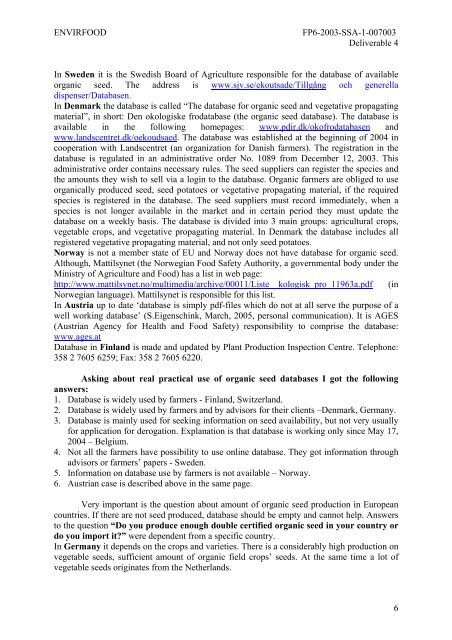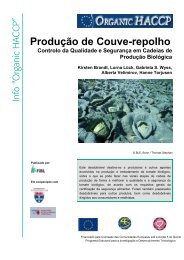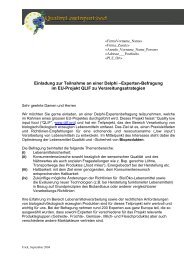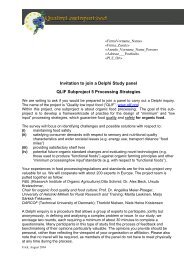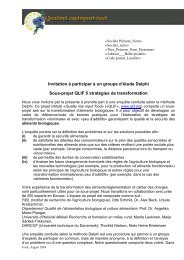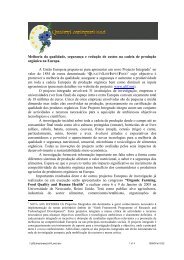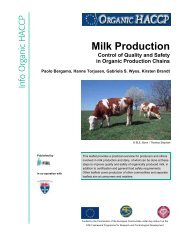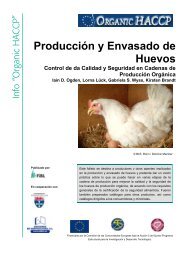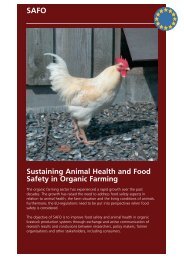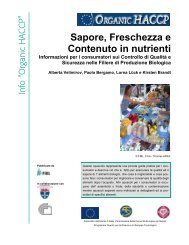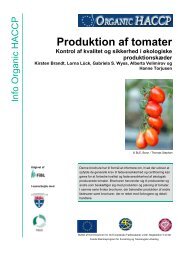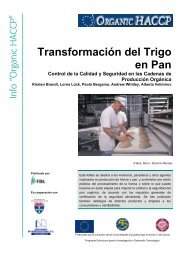ORGANIC SEED PROPAGATION: CURRENT STATUS AND ...
ORGANIC SEED PROPAGATION: CURRENT STATUS AND ...
ORGANIC SEED PROPAGATION: CURRENT STATUS AND ...
You also want an ePaper? Increase the reach of your titles
YUMPU automatically turns print PDFs into web optimized ePapers that Google loves.
ENVIRFOOD<br />
FP6-2003-SSA-1-007003<br />
Deliverable 4<br />
In Sweden it is the Swedish Board of Agriculture responsible for the database of available<br />
organic seed. The address is www.sjv.se/ekoutsade/Tillgång och generella<br />
dispenser/Databasen.<br />
In Denmark the database is called “The database for organic seed and vegetative propagating<br />
material”, in short: Den okologiske frodatabase (the organic seed database). The database is<br />
available in the following homepages: www.pdir.dk/okofrodatabasen and<br />
www.landscentret.dk/oekoudsaed. The database was established at the beginning of 2004 in<br />
cooperation with Landscentret (an organization for Danish farmers). The registration in the<br />
database is regulated in an administrative order No. 1089 from December 12, 2003. This<br />
administrative order contains necessary rules. The seed suppliers can register the species and<br />
the amounts they wish to sell via a login to the database. Organic farmers are obliged to use<br />
organically produced seed, seed potatoes or vegetative propagating material, if the required<br />
species is registered in the database. The seed suppliers must record immediately, when a<br />
species is not longer available in the market and in certain period they must update the<br />
database on a weekly basis. The database is divided into 3 main groups: agricultural crops,<br />
vegetable crops, and vegetative propagating material. In Denmark the database includes all<br />
registered vegetative propagating material, and not only seed potatoes.<br />
Norway is not a member state of EU and Norway does not have database for organic seed.<br />
Although, Mattilsynet (the Norwegian Food Safety Authority, a governmental body under the<br />
Ministry of Agriculture and Food) has a list in web page:<br />
http://www.mattilsynet.no/multimedia/archive/00011/Liste__kologisk_pro_11963a.pdf (in<br />
Norwegian language). Mattilsynet is responsible for this list.<br />
In Austria up to date ‘database is simply pdf-files which do not at all serve the purpose of a<br />
well working database’ (S.Eigenschink, March, 2005, personal communication). It is AGES<br />
(Austrian Agency for Health and Food Safety) responsibility to comprise the database:<br />
www.ages.at<br />
Database in Finland is made and updated by Plant Production Inspection Centre. Telephone:<br />
358 2 7605 6259; Fax: 358 2 7605 6220.<br />
Asking about real practical use of organic seed databases I got the following<br />
answers:<br />
1. Database is widely used by farmers - Finland, Switzerland.<br />
2. Database is widely used by farmers and by advisors for their clients –Denmark, Germany.<br />
3. Database is mainly used for seeking information on seed availability, but not very usually<br />
for application for derogation. Explanation is that database is working only since May 17,<br />
2004 – Belgium.<br />
4. Not all the farmers have possibility to use online database. They got information through<br />
advisors or farmers’ papers - Sweden.<br />
5. Information on database use by farmers is not available – Norway.<br />
6. Austrian case is described above in the same page.<br />
Very important is the question about amount of organic seed production in European<br />
countries. If there are not seed produced, database should be empty and cannot help. Answers<br />
to the question “Do you produce enough double certified organic seed in your country or<br />
do you import it?” were dependent from a specific country.<br />
In Germany it depends on the crops and varieties. There is a considerably high production on<br />
vegetable seeds, sufficient amount of organic field crops’ seeds. At the same time a lot of<br />
vegetable seeds originates from the Netherlands.<br />
6


